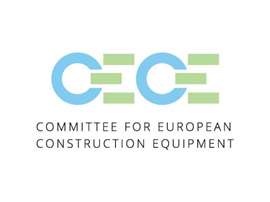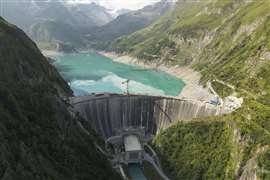Read this article in Français Deutsch Italiano Português Español
CECE: The sustainable reindustrialisation of Europe should be a key priority
12 April 2024
The Committee for European Construction Equipment (CECE), which represents and promotes European construction equipment and related industries, calls for the sustainable reindustrialisation of Europe as a key priority of the next EU legislative mandate.

CECE calls for the sustainable reindustrialisation of Europe as a key priority of the next EU legislative mandate.
The next legislature must be less centred on rule-making and more on measures to aid the goal of reindustrialising Europe for a future-fit and sustainable economy.
The European construction equipment industry forms an integral part of the European engineering sector, comprising 1,200 companies ranging from highly specialised SMEs to large European and multinational companies with production sites in Europe.
The sector holds significant potential to turn the Green Deal into a growth strategy. This potential is being realised, through manufacturers’ own initiative, with the adoption of clean technology and reduction of emissions in recent decades.
Yet to fully leverage the capacity of construction machinery, technology neutral EU policies and enabling factors are fundamental, especially with fierce competition from other global players.
Consequently, the CECE Manifesto outlines a number of policies to assist Europe’s reindustrialisation.
Single market
While the free movement of people, goods, services, and capital are integral to the European construction equipment sector’s resilience, ensuring a stable legal framework and business-friendly policies is a prerequisite for continued investment and innovation.
Specifically, effective market surveillance is critical as the current influx of non-compliant construction machinery into the Single Market threatens global competitiveness of EU-made machinery.
As such, CECE urges that the regulatory and administrative burden on European companies be reduced and that the market surveillance framework is duly applied. The new framework for EU harmonised road circulation for non-road mobile machinery should be swiftly implemented and compliance with the Machinery Regulation facilitated through a comprehensive and timely guide.
Path to decarbonisation
Construction machinery manufacturers are already working on the use of low or net-zero CO2 energy carriers, together with further efficiency improvements and reductions in consumption.
To leverage the potential for decarbonisation offered by modern machinery, it is important to transition from a solely machine-focused approach to a more holistic view, the so-called CECE 4-pillar approach.
Therefore, CECE asks that decarbonisation policies are synchronised with other regions of the world, that technological neutrality be upheld, and the production and availability of low or net-zero CO2 energy carriers be fostered.
Refuelling infrastructure for these carriers needs to be deployed on a large scale, and fleet renewal incentivised through the European Investment bank. Furthermore, an EU-wide framework for public procurement that supports sustainable solutions in public tenders should be developed.
Digital transition and data
 European construction equipment manufacturers account for revenues of € 40 billion (Photo: AdobeStock)
European construction equipment manufacturers account for revenues of € 40 billion (Photo: AdobeStock)
CECE supports the digital transformation of the construction sector. The potential of the digital transition in the construction equipment sector is substantial and CECE members are already introducing digital tools to bring more sustainable construction processes.
CECE believes that this approach should be facilitated by policymakers. The 2019-2024 Commission introduced some fundamental legal texts in this field, which now require substantial efforts and time for implementation.
As such, CECE calls for support to manufacturers in the proper and consistent implementations of the Data, AI and Cyber-Resilience Acts. Harmonised standards and effective guidance for implementation of the CRA should be delivered in consistency with existing legislation.
The implementation of the Data Act should not hinder B2B contractual freedom or protection of trade secrets and the digital skills gap in areas such as AI and cybersecurity should be tackled through the funding of training programmes.
Global competitiveness
European construction equipment manufacturers account for revenues of € 40 billion, of which € 26 billion is derived from sales beyond national borders. Coupled with the fact that the sector is traditionally export-orientated leads CECE to advocate strongly for free trade and open markets.
At the same time, it is essential that EU industry is supported in maintaining its competitiveness on an international scale, ensuring that manufacturers continue to invest in Europe.
CECE calls for the ratification and implementation of the EU-Mercosur and EU-India free-trade agreements and supports the enforcement of the EU Customs Union with Türkiye. Investigations into unfair commercial practices of EU’s global competitors are to be carried out, and a permanent solution to the EU-US steel and aluminium tariffs must be found.
CECE calls for a reaffirmed commitment to Ukraine’s reconstruction. Support for sustainable mining is also needed, with the full implementation of the Critical Raw Materials Act and ratification of the “MAC” protocol.
The European construction equipment industry is crucial in bringing forth a prosperous green and digital economy and strengthened EU competitiveness, but it cannot do so without the necessary support. Reindustrialisation must be the priority of the next legislature, as well as the policies needed to sustain it.
The Manifesto was officially launched in Brussels on 20 March and can be downloaded on cece.eu/ep2024.ce
STAY CONNECTED


Receive the information you need when you need it through our world-leading magazines, newsletters and daily briefings.
CONNECT WITH THE TEAM











